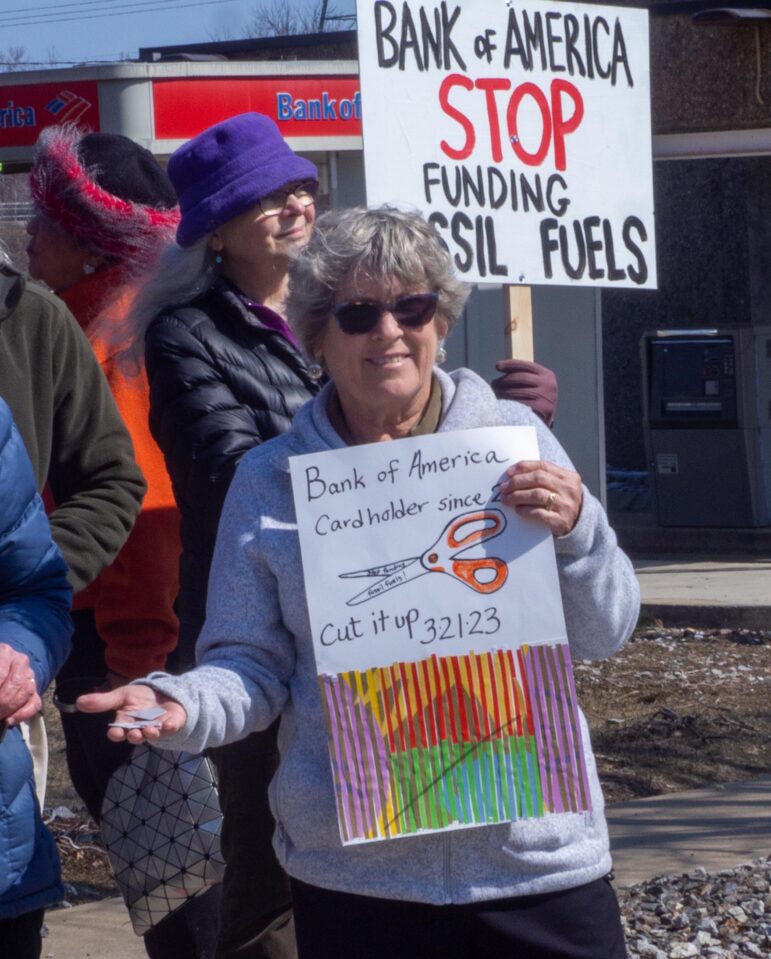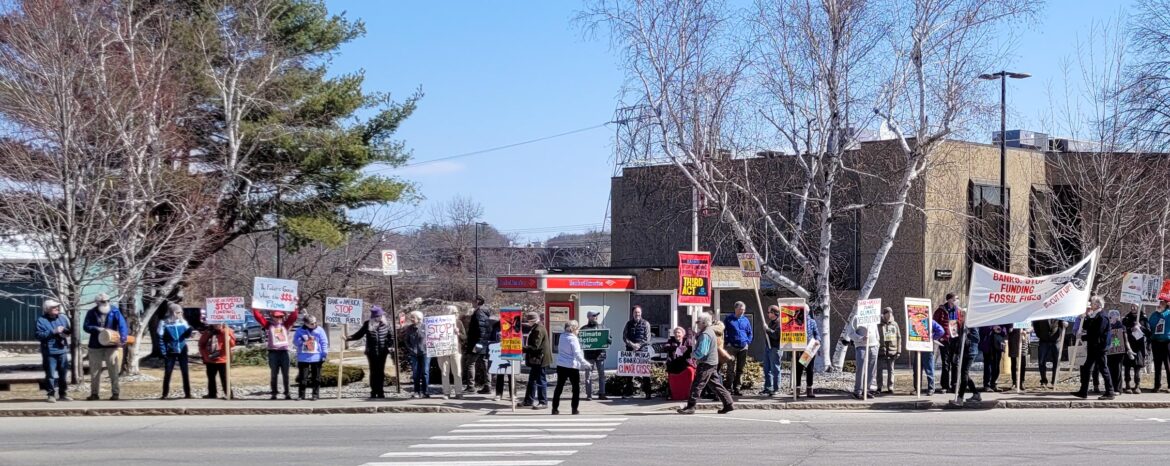By Arnie Alpert, Active with the Activists
CONCORD—The day after the United Nations released another dire report on the unfolding climate disaster, 55 people, almost all over 60, showed up outside Bank of America’s branch on Storrs Street in Concord with signs and banners protesting the financial giant’s complicity in fossil fuel use.
It was a national day of action initiated by Third Act, a year-old group focused on organizing older Americans to join younger ones in climate action.
Third Act’s “Stop Dirty Banks” campaign is focused on four major banks, JP Morgan Chase, Citibank, Wells Fargo, and Bank of America, which the group says are “continuing to fund the expansion of fossil fuel projects.”
According to a statement on Third Act’s website, thousands of people have pledged to close accounts, cut up their credit cards, and boycott the four banks if they don’t move their investments out of fossil fuels. The group said demonstrations were planned Tuesday in more than 100 locations.
The demonstration in Concord was organized by Deborah Mahar, a Warner resident who retired two years ago after a long teaching career. Disturbed by global climate disruption, she found her way to Third Act, joined national zoom calls, and stepped up to organize today’s protest. Activism isn’t exactly new for Mahar, but in the decades since she protested the Vietnam War as a high school student in Virginia, it “sort of faded out” from her life, replaced by art school and teaching. In recent years, she said, she has attended a few State House demonstrations in support of reproductive and immigrant rights, but had never before been the one making things happen. “I’ve never organized anything like this before,” she said.

Asked why they chose to target Bank of America, she said it’s “because of the trillions of dollars they’re investing in fossil fuels, and that they haven’t made a concerted effort to agree to stop doing that. They just continue to invest in new oil drilling and new fracking and new projects.”
Last week she stopped by the Storrs Street branch office and informed one of the managers about plans for the demonstration. Perhaps that was why the bank had a security guard from Allied Universal Security stationed outside on Tuesday afternoon. Inside, a bank staffer who identified herself only as “Rebecca,” told me “we don’t do that here” when I asked if there was anyone I could talk to about the bank’s response to a demonstration outside their doors. She suggested I contact customer service, but declined to give me a name or number.
Bank of America is a member of the UN-sponsored Net Zero Banking Alliance and says it has “a commitment to achieve net zero greenhouse gas (GHG) emissions across our financing activities, operations and supply chain before 2050.”
“Consistent with our approach toward Responsible Growth,” the bank adds, “we are helping finance this transition by setting and achieving milestone targets, partnering with clients to support their transition, investing in climate solutions, developing and reporting decision-useful metrics to drive progress, leading industry collaborations, and following guidance for transparency.”
A different picture emerges in “Banking on Climate Chaos,” a report produced a year ago by Rainforest Action Network, BankTrack, and four other NGOs. “Overall fossil fuel financing remains dominated by four U.S. banks — JP Morgan Chase, Citi, Wells Fargo, and Bank of America — who together account for one quarter of all fossil fuel financing identified over the last six years,” says the report, backed up with an array of charts and graphs.
Rainforest Action Network adds, “Between 2016 and 2021, Bank of America provided $232 billion in lending and underwriting to the fossil fuel industry, fourth among global banks. Over that period, the bank’s top fossil client was Exxon Mobil, with $15.3 billion in lending and underwriting provided.”
Tuesday’s demonstration in Concord drew people from as far away as Greenville and North Sandwich, many with connections to groups such as 350NH, Citizens Climate Lobby, and No Coal No Gas. Laura Magzis of Concord is active with the Sierra Club. She’s marched for plenty of causes, she said, but “climate is the major thing.”
Magzis said she juggled her schedule to be able to join the demonstration at Bank of America and showed up sporting a red cap that read, “Make America Cool Again.” “I think it’s a great idea to mobilize older folks,” she told me. And as for the point of the action, she added, “money is very important. Where the money goes is very important.” She thinks actions like this one can have “a little bit of an impact.”
Some participants hoped to have a bigger impact. Scissors in hand, Jennifer Smith of Pembroke sliced her credit card into pieces and said, “I’m gonna mail off these pieces of card to Bank of America and tell them I’m not going to use it anymore.”
Donna Baker-Hartwell of East Andover, also a Bank of America customer, said she visited the branch bank last month. “I asked them about their investments and funding of fossil fuel projects,” including in the southwest United States and in Alaska. She also inquired about how 401-K funds were invested, but said the bank representative didn’t know. Afterward, she sent a letter to the CEO in North Carolina asking when the bank is going to stop giving financial backing to fossil fuel companies. She’s still waiting for an answer.
“Anyway, today I cut up my card, done with it. Done with it. Didn’t get the answers that I wanted. Bank of America card, I’d had it since 2007. Done. I’ve done with it.” Like Smith, she thinks she’ll send the pieces back to the bank, perhaps to the local representative she met with last month.
Three others also wielded scissors and cut up their credit cards.
In response to several requests for comments from Bank of America representatives, Sheryl Lee from the bank emailed me to say, “Please put us down as a decline comment.“
Deborah Mahar says that prior to today, there wasn’t anything like a local chapter of Third Act, but with today’s turnout she’s optimistic about forming one. “We also may decide to come back here once or twice a week with our signs and just stand at the corner and continue to raise awareness.”
Does it matter?
Mahar said that when she started working with Third Act, she was distressed that her 15-year-old grandson told her, “’It’s too late, we’ve destroyed it.’ And that broke my heart.”
Monday, while they were riding to one of her grandson’s concerts, he told her, “I understand what you’re doing now. Because if we don’t do anything, we’re just sitting here. We’re just lumps.”
“That was really cool,” Mahar said with a smile.






